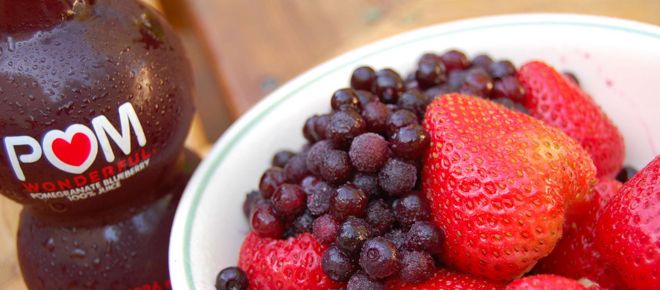Antioxidants: Can they save you or kill you quicker?
Forget supplements: you’re better off with fruits and veggies
Photo by gabster_ro c/o Flickr Creative Commons
Share

The Statement: Antioxidants for “building strong bones and teeth” and “protection and healing while improving memory function.”— Cafeteria signage, 07/28/2011
Like many of you, dear readers, on my way to lunch every day I am met with a barrage of well-intentioned signs in my workplace cafeteria that extol the benefits of antioxidants. According to these colourful posters, antioxidants do everything from build strong bones and teeth to protect and heal the body (whatever that means) while also improving memory function.
These signs ring bells: naturally, Science-ish is skeptical of any life-preserving miracle cures. So we asked: what are antioxidants and what do they really do for the body?
First, we must begin with free radicals, which are molecules that have at least one unpaired electron and therefore can be unstable and highly reactive. The theory goes oxidation (or oxygen metabolism), which is a natural process needed to sustain life, also causes the formation of free radicals, and the free radicals can age and damage your cells, leading to diseases such as cancer.
That’s where antioxidants come in. Found in many foods—from fruits and vegetables to wine, chocolate, and tea—antioxidants are thought to interact with the free radicals, stabilize them, and prevent some of the damage they would otherwise cause. In other words, they protect the body’s cells from the sometimes harmful effects of those wild free radicals.
So it would seem to make sense that consuming more antioxidants—drinking pomegranate juice and eating carrots at lunch, topping up with vitamin supplements C and E—leads to more health benefits, which is probably why the thinkers behind the lunchroom signage encourage cafeteria-dwellers to dive in.
But the science shows that more antioxidants, particularly those derived from vitamin supplements, have no health benefits and, what’s worse: they can kill you early.
A 2008 systematic review of the literature on antioxidants found no evidence to support the seemingly widely accepted use of antioxidant supplements, such as vitamins A and E, and beta-carotene. Instead, the researchers concluded, these substances may increase mortality. “Antioxidant supplements need to be considered medicinal products and should undergo sufficient evaluation before marketing,” they wrote.
Similarly, a comprehensive evidence report out of Johns Hopkins University stated: “With few exceptions, neither beta-carotene nor vitamin E had benefits for preventing cancer, cardiovascular disease, cataract, and age-related macular degeneration.” Beta-carotene supplements actually increased the risk of lung cancer in people at risk (smokers and those exposed to asbestos).
Though I’ve pointed to some of the newer and more comprehensive evidence, it by no means tells a different story from what the scientific community has known for years about antioxidants.
As science writer Ben Goldacre outlines in his book Bad Science, a large 1994 study—published in the New England Journal of Medicine—investigated the then-promising notion that diets rich in carotenoid-rich fruits and vegetables, as well vitamin E and beta carotene, were associated with a reduced risk of lung cancer. Nearly 30,000 Finnish people with a high risk of lung cancer were recruited for the study, and the findings dashed the hopes of researchers when it was revealed that those who received beta-carotene supplements had more deaths overall—from lung cancer and heart disease—compared to those who received a placebo.
The well-documented Beta-Carotene and Retinol Efficacy Trial (CARET) was similarly alarming: it looked at the effect of daily beta-carotene and vitamin A on the incidence of lung cancer, other cancers, and death in over 18,000 people at risk for lung cancer, and had to be stopped ahead of schedule in 1996. The reason? Those assigned to receive the vitamins were found to have a 28% increase in incidence of lung cancer, a 17% increase in incidence of death, and a higher rate of cardiovascular disease mortality compared with the control group.
Where does this leave us? Since there’s no scientific evidence to back the use of supplemental antioxidants, sticking to the old commonsensical balanced diet plan with fruits and vegetables should do the trick.
*Thank you to reader @helenspitzer for requesting a post on antioxidants.
Science-ish is a joint project of Maclean’s, The Medical Post, and the McMaster Health Forum. Julia Belluz is the associate editor at The Medical Post. Got a tip? Seen something that’s Science-ish? Message her at [email protected] or on Twitter @juliaoftoronto